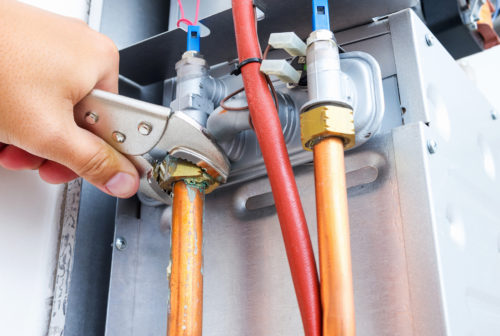Plumber repairing a gas boiler of a heating home system in the boiler room. Close-up, selective focus.

Federal Efficiency Standards: A Win for Families, Health & Climate
Sometimes, seemingly mundane regulations can have big, far-reaching impacts. As an example of this, the US Department of Energy’s (DOE) proposed ruling last week on efficiency standards for gas furnace & heaters could lead to a win for the pocketbooks of families, for the health of communities and children, and for the climate.
Chances are if you’re reading this blog, you know we need to move to all-electric appliances immediately because they are most efficient, cleaner, healthier, and safer. That’s why the District of Columbia’s Sustainable Energy Utility stopped subsidizing residential gas appliances last week in their efficiency programs, and California updated their building codes to prioritize electric appliances.
But as we make that transition, DOE can help families save money and protect public health by requiring the use of condensing equipment in gas water & space heaters, which make these devices more efficient and reduces pollution. DOE took the first step to doing so last week by undoing a last-ditch effort by gas companies during the Trump Administration to block improved efficiency requirements for space and water heaters.
Efficiency Standards Provide Multiple Benefits
Increased efficiency standards for appliances are a win-win-win. More efficient appliances use less fuel and electricity, saving consumers over the lifetime of products. DOE previously calculated that requiring condensing equipment on gas water and space heaters would save the average household between $500 and $750 over their lifetimes, factoring in both up-front costs and gas bills. Those savings are likely to increase as the cost of gas skyrockets in the future.
In addition to saving households on their utility bills, condensing designs also produce fewer pollutants, including nitrogen oxides (NOX), than those without condensers. This has implications for public health, as NOX are a precursor for dangerous particulate matter pollution. In fact, a recent study by the Harvard T.H. Chan School of Public Health found that combusting gas, wood, and biomass in buildings has more negative health effects than burning coal in many states. And because they pollute less, these heaters are less likely to contribute to childhood asthma—a particular risk for low-income communities and communities of color. Again, though, electric appliances that produce no such pollution are even better.
More efficient appliances also mean less climate pollution: DOE found that over 30 years of sales, condensing units could avoid 275 million tons of CO2 emissions. Of course that number will increase when manufacturers agree to stop making gas heaters altogether. Given the severity of the climate crisis, we are going to need to use all levers to reduce climate pollution in line with a 1.5°C future—including more efficient appliances.
Incentives & Rebates Needed
Currently, low- and moderate-income households suffer disproportionate economic and health burdens from the use of fossil fuel appliances. However, these households often lack access to the capital needed to pay the up-front costs of a home retrofit or cleaner, safer, healthier, and more efficient appliances. That is particularly true when their home needs health and safety repairs too.
Incentives and rebates—such as those being considered as part of the budget reconciliation process—will be essential in helping overburdened and underserved households access comprehensive retrofits and more efficient, cleaner, healthier options.
The All-Electric Future
As we noted earlier, there is a solution that is more efficient and has zero pollution inside our homes: all-electric appliances such as heat pumps and induction stoves. As these electric appliances are healthier, safer, and less expensive to operate in many parts of the country, they should be the first and only choice.
There is a lot more work to be done to move to an all-electric future, including helping every low- and moderate-income household afford a comprehensive retrofit off fossil fuels in the next decade. And until we get to an all-electric future, DOE can take a small action with big benefits for families by requiring all gas heaters use condensing equipment to improve efficiency and save money.